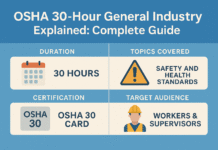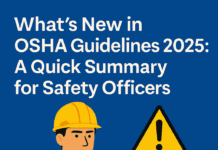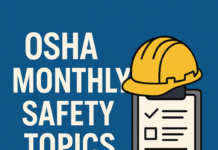
OSHA 30-Hour General Industry vs Construction: Which One to Choose?
Are you confused about whether to take the OSHA 30-Hour General Industry or Construction course? You’re not alone. Many professionals struggle with this decision, especially those who work in industries where responsibilities overlap. But choosing the right course can significantly impact your safety knowledge, job prospects, and long-term career growth. So let’s break it down, step-by-step, and figure out which path is right for you.
What Is OSHA 30-Hour Training?
The OSHA 30-Hour courses are comprehensive safety training programs developed by the Occupational Safety and Health Administration (OSHA). These courses are designed for supervisors, safety professionals, and workers with safety responsibilities. Unlike the shorter 10-hour course, which is more suitable for entry-level workers, the 30-hour course dives deep into safety regulations, hazard recognition, and compliance practices.
OSHA 30-Hour General Industry Course
This course is geared toward workers in sectors like manufacturing, warehousing, healthcare, and logistics. If you spend your day inside a factory, warehouse, hospital, or plant, this course is likely the one for you.
Key Industries Covered:
- Manufacturing
- Warehousing
- Health care facilities
- Food processing
- Distribution centers
Common Roles That Need This Course:
- Safety coordinators
- Maintenance supervisors
- Plant managers
- Lab technicians
- Warehouse team leads
Key Topics in OSHA 30 General Industry
- Hazard Communication – Understanding chemicals and safety data sheets
- Lockout/Tagout (LOTO) – Ensuring machines are safely turned off before maintenance
- Walking and Working Surfaces – Preventing slips, trips, and falls
- Personal Protective Equipment (PPE) – Selecting and using the right gear
- Machine Guarding – Protecting workers from moving parts
- Electrical Safety – Avoiding shocks and arc flashes
OSHA 30-Hour Construction Course
This course is perfect for professionals who work on construction sites—whether you’re building skyscrapers, laying down roads, or working on residential homes.
Industries Covered:
- Commercial construction
- Residential construction
- Infrastructure and roadwork
- Heavy civil and industrial projects
Common Roles That Need This Course:
- Site supervisors
- Civil engineers
- Construction foremen
- Project managers
- Safety officers
Key Topics in OSHA 30 Construction
- Fall Protection – Number one hazard on job sites
- Scaffolding Safety – Working on temporary elevated structures
- Excavations and Trenching – Avoiding collapses and cave-ins
- Ladder Safety – Correct ladder use and inspection
- Tool Safety – Using hand and power tools safely
- Cranes and Rigging – Safe lifting procedures
Side-by-Side Comparison Table
| Feature | OSHA 30 General Industry | OSHA 30 Construction |
|---|---|---|
| Target Audience | Factory/warehouse workers, healthcare staff | Construction workers, site managers |
| Key Hazards | Electrical, chemicals, LOTO, PPE | Falls, scaffolds, trenches, ladders |
| Work Environment | Indoors, controlled environments | Outdoor, dynamic job sites |
| Cert Validity | No expiration (recommended refresher every 3-5 years) | No expiration (recommended refresher every 3-5 years) |
How to Decide Which Course Is Right for You
Ask yourself:
- Do I work mostly on a construction site or in a warehouse/factory?
- Does my job involve operating or maintaining machines, or overseeing construction projects?
- What does my employer or client require?
If you’re still unsure, talk to your safety officer or HR rep. They’ll likely point you in the right direction.
Which Course Offers Better Career Opportunities?
Both are highly respected, but job relevance matters. A construction site manager with a General Industry card might not meet OSHA expectations. Similarly, a factory supervisor won’t benefit from learning about scaffolding. Tailor your training to your field, and the job market will reward you.
OSHA 30 Certification Validity and Renewal
Technically, OSHA 30 certifications don’t expire. However, many employers expect a refresher every 3-5 years due to changing regulations. New standards? New hazards? Stay updated to stay relevant.
Online vs In-Person OSHA 30 Training
Online training offers flexibility—you can study from home, on your schedule.
In-Person training is hands-on and better for those who prefer face-to-face interaction.
Just make sure the provider is OSHA-authorized, especially for online courses.
Cost of OSHA 30 Courses
Prices vary, but expect to pay between $150–$250 USD. It’s a small price to pay for a certification that could open doors and even save lives.
What Happens After You Complete the Course?
You’ll receive:
- A digital completion certificate
- A durable plastic OSHA 30 wallet card (via mail)
- Recognition from employers and job platforms
Use this credential to boost your resume and land higher-paying roles.
Real-World Examples of OSHA 30 Impact
- Jorge, a warehouse supervisor in Texas, used his OSHA 30 card to negotiate a 15% raise.
- Fatima, a civil engineer in New York, secured a major promotion after completing her OSHA 30 Construction course.
- Arjun, a safety officer in Dubai, was able to switch industries confidently thanks to the foundational knowledge.
Common Mistakes When Choosing OSHA Courses
- Taking Construction when you work in General Industry (and vice versa)
- Ignoring employer-specific requirements
- Choosing unrecognized training providers
- Forgetting to check for group or team discounts
Final Thoughts: General Industry or Construction?
Still not sure? Here’s the cheat sheet:
- Construction site? Choose OSHA 30 Construction
- Warehouse, factory, hospital, or plant? Go with OSHA 30 General Industry
Whatever you choose, remember—this course isn’t just about passing a test. It’s about protecting yourself and your team every single day.
What is New in OSHA Guidelines 2025: A Quick Summary for Safety Officers
OSHA Monthly Safety Topics 2025
OSHA and IOSH Officer Salary in Dubai
Check your OSHA Certificate is Original or Fake?
How To Become an OSHA Inspector in 5 Steps
FAQs
Q1: Can I take both OSHA 30 Construction and General Industry?
Yes! Many professionals take both to expand their safety knowledge and job flexibility.
Q2: Is OSHA 30 mandatory?
Not legally, but many employers require it for supervisory roles.
Q3: What’s the difference between OSHA 10 and OSHA 30?
OSHA 10 is for entry-level workers. OSHA 30 is for supervisors and those with safety responsibilities.
Q4: Is there an OSHA 30 refresher course?
OSHA doesn’t mandate it, but refresher training is recommended every 3-5 years.
Q5: Is OSHA 30 recognized internationally?
It’s primarily a U.S. standard, but many international companies adopt OSHA standards—especially in the Middle East and Asia.
























